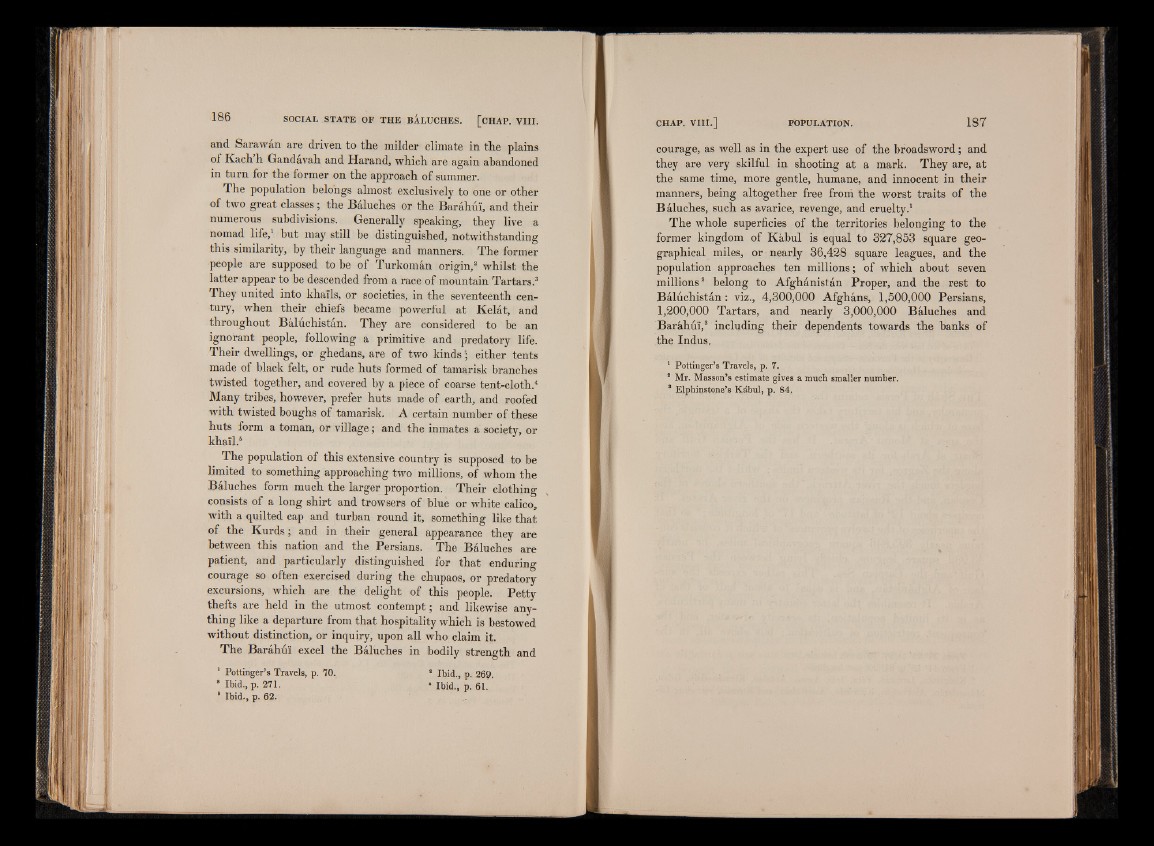
and Sara wan are driven to the milder climate in the plains
of Kach h Gandavah and Harand, which are again abandoned
in turn for the former on the approach of summer.
The population belongs almost exclusively to one or other
of two great classes; the Baluches or the Barahui, and their
numerous subdivisions. Generally speaking, they live a
nomad life,1 but may still be distinguished, notwithstanding
this similarity, by their language and manners. The former
people are supposed to be of Turkoman origin,2 whilst the
latter appear to be descended from a race of mountain Tartars.3
They united into khai'ls, or societies, in the seventeenth century,
when their chiefs became powerful at Kelat, and
throughout Baluchistan. They are considered to be an
ignorant people, following a primitive and predatory life.
Their dwellings, or ghedans, are of two kinds *; either tents
made of black felt, or rude huts formed of tamarisk branches
twisted together, and covered by a piece of coarse tent-cloth.4
Many tribes, however, prefer huts made of earth, and roofed
with twisted boughs of tamarisk. A certain number of these
huts form a toman, or village; and the inmates a society, or
khai'l.5
The population of this extensive country is supposed to be
limited to something approaching two millions, of whom the
Baluches form much the larger proportion. Their clothing
consists of a long shirt and trowsers of blue or white calico,
with a quilted cap and turban round it, something like that
of the Kurds; and in their general appearance they are
between this nation and the Persians. The Baluches are
patient, and particularly distinguished for that enduring
courage so often exercised during the chupaos, or predatory
excursions, which are the delight of this people. Petty
thefts are held in the utmost contempt; and likewise anything
like a departure from that hospitality which is bestowed
without distinction, or inquiry, upon all who claim it.
The Barahui excel the Baluches in bodily strength and
1 Pottinger’s Travels, p. 70. « Ibid., p. 269.
* Ibid., p. 271. 4 Ibid., p. 61.
i ti ; i -
courage, as well as in the expert use of the broadsword; and
they are very skilful in shooting at a mark. They are, at
the same time, more gentle, humane, and innocent in their
manners, being altogether free from the worst traits of the
Baluches, such as avarice, revenge, and cruelty.1
The whole superficies of the territories belonging to the
former kingdom of Kabul is equal to 327,853 square geographical
miles, or nearly 36,428 square leagues, and the
population approaches ten millions; of which about seven
millions2 belong to Afghanistan Proper, and the rest to
Baluchistan: viz., 4,300,000 Afghans, 1,500,000 Persians,
1,200,000 Tartars, and nearly 3,000,000 Baluches and
Barahui,3 including their dependents towards the banks of
the Indus,
1 Pottinger’s Travels, p. 7.
* Mr. Masson’s estimate gives a much smaller number.
3 Elphinstone’s Kabul, p. 84,